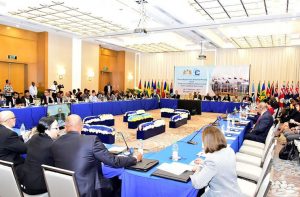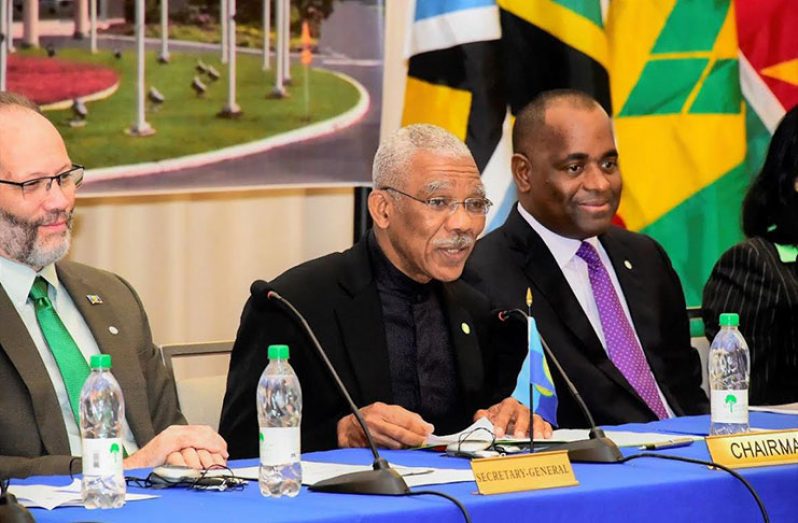Reflecting on the “Spirit of Chaguaramas” President of Guyana and Chairman of CARICOM, President David Granger, on Thursday called for full implementation of the Caricom Single Market and Economy (CSME).President Granger was at the time speaking during the opening ceremony of the 28th Inter-Sessional Meeting of the Conference of Heads of Government of CARICOM being held at the Marriott Hotel, Georgetown, Guyana. He said economic cooperation remains a fundamental pillar of CARICOM and noted that if the Caribbean is to escape the “hazard of economic emasculation” in today’s global environment, there is need to “expedite the full implementation of the CSME.”
“We face threats that include dampened demand for our goods and services and distortions in our financial sectors caused by de-risking by international banks.
The CSME has the potential to enhance private sector growth and competitiveness by providing access to a larger pool of resources, facilitating the movement of human capital, catalysing the establishment of regional businesses and encouraging the free movement of goods. The CSME must not be allowed to become a victim of equivocation and procrastination,” said the CARICOM Chairman.
The Guyanese leader noted that functional cooperation is also an elemental pillar of the Community and noted that CARICOM has the capacity to meet its food needs. Food security, he noted ensures the health and nutritional benefits of the Region’s people, foreign exchange and eliminates the ever-increasing bill for food importation.
“Ensuring regional food security is a cross-sectoral task involving cooperation in agriculture, finance, health and nutrition and infrastructure, among other sectors. Belize, Guyana and Suriname – the Community’s three mainland states – are, together, bigger than Germany or Japan,” President Granger reminded.
Additionally, President Granger stressed that food security can be advanced by the “fuller utilization” of lands for large-scale investment in agriculture and agro-processing as well as by “dismantling barriers to regional trade in agricultural products.”
That aside, the Guyanese head of state said CARICOM must intensify its efforts at regional energy security, while stressing that the Region has the means to do so as it is blessed with abundant sources of renewable energy. He said too that the Community has done ‘considerable, commendable work towards ensuring energy security which can ease the Community’s energy sector off of its addiction to fossil fuel and encourage the adoption of renewable sources of energy.”

Meanwhile, the CARICOM Chair noted the importance of Regional security to the development of the Bloc. He said the Caribbean is a maritime corridor between two continents and is vulnerable to narcotics trafficking, human trafficking, gun-running, terrorism and penetration by international criminal cartels.
Given the existing threats, transnational criminal threats demand multinational functional cooperation.
“We live in uncertain times. We must continuously strengthen our security architecture in order to assure citizens and investors of greater security and stability. We must be vigilant, also, in the face of continuing threats to the sovereignty and territorial integrity of our member states,” said President Granger. He stressed that the ‘Spirit of Chaguaramas’ is not “the ghost or ‘jumbie’ of a dead project. It is the vital breath of life that inspires us to intensify regional integration” while noting that the four founding fathers of CARICOM Barbados’s Errol Barrow, Guyana’s Forbes Burnham, Jamaica’s Michael Manley and Trinidad and Tobago’s Eric Williams dreamed of integration and the motivation to establish a great movement.
“They have entrusted the happiness of our citizens and the prosperity of our Community to our hands. We are, today, the trustees of this legacy. We must bequeath to our progeny a more prosperous region than we inherited from our progenitors,” Granger said affirmatively.
The President described the founding leaders of CARICOM as men of discernment and determination, noting that they were courageous pioneers of the future. “They were not craven prisoners of the past,” he stated. Granger noted too that they were keen to protect the emergent new states from the perils of economic marginalisation when regional integration communities such as the European Economic Community, Latin American Free Trade Association, Central American Common Market and the emerging East-African Economic Community had taken root.
Global trends were clear he said noting that options were limited; it was integrate or disintegrate; combine or collapse; merge or be submerged in a sea of strife. It was based on the world trends that the four founding fathers recognised that given the small size of the region’s markers, integration would allow for larger and safer markets and for a stronger voice in negotiating with other countries and regions.
They knew that regional integration was “an obligation, not an option” for governments. Granger quoted Linden Forbes Sampson Burnham, one of the founding leaders of CARICOM when he spoke at the Conference of officials of the Commonwealth Caribbean Territories in Georgetown, in August 1967 where he warned that without integration, Caribbean states could become objects of neo-colonialist exploitation and become international mendicants.
The CARICOM Chair noted that a ‘common, positive policy’ was conceived and CARICOM’s foundation was laid on the three pillars of economic integration, foreign policy coordination and functional cooperation with a fourth pillar on security collaboration added by the Region’s heads.
“The Treaty of Chaguaramas was a response to the challenges of the post-colonial era. The Revised Treaty of Chaguaramas was the response to the post-Cold War era, a time of increasing trade liberalisation and the growth of regional organisations,” said President Granger.




.png)









